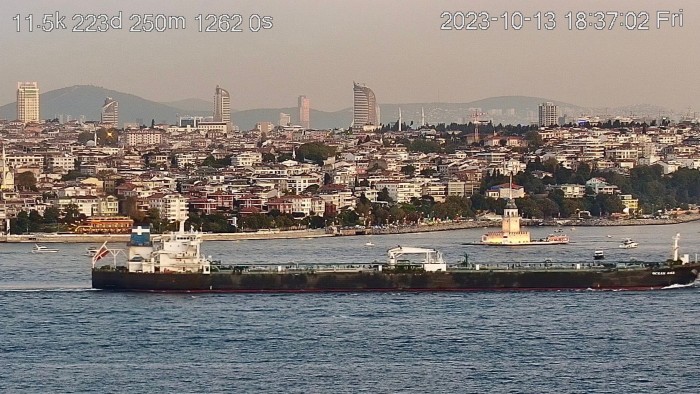Unlock the Editor’s Digest totally free
Roula Khalaf, Editor of the FT, selects her favorite tales on this weekly publication.
The boss of the world’s largest publicly listed oil tanker operator has accused the UN maritime rule-setting physique of “sleeping behind the wheel” over the rising darkish fleet of unregulated vessels, saying it’s “solely a query of time” earlier than a big catastrophe takes place.
Lars Barstad, chief govt of Frontline, additionally criticised European governments for failing to implement guidelines meant to curtail buying and selling in Russian oil, saying they had been fearful about forcing up vitality costs.
The variety of darkish fleet vessels has grown to a couple of fifth of the world fleet after Russian-linked house owners purchased up a whole lot of ageing ships to bypass western nations’ curbs on the nation’s oil commerce.
The potential for catastrophe was illustrated in July when the Hafnia Nile, a tanker operated by Singapore-based Hafnia, collided with the Ceres I, a darkish fleet vessel carrying Iranian oil, in waters off Malaysia.
In accordance with a subsequent US Treasury sanctions discover towards the Ceres I’s house owners, on the time of the collision the vessel’s radar system was broadcasting an inaccurate location — a standard tactic for darkish fleet ships attempting to hide their actions.
Darkish fleet vessels, which carry oil from Iran and Venezuela in addition to Russia, are usually the property of offshore corporations whose possession is unclear and infrequently lack satisfactory insurance coverage. They’re often registered beneath the flags of nations that do little to implement guidelines about common security inspections.

Barstad mentioned he was “very, very involved” in regards to the progress of the darkish fleet, which he mentioned had incentivised quite a lot of “lawbreaking operators” to make an “insane amount of cash”.
He added that the Worldwide Maritime Group (IMO), the UN physique, was doing too little to make sure enforcement of its security and environmental guidelines.
“All these vessels . . . are buying and selling outdoors the IMO framework,” Barstad mentioned. “They’ve been sleeping behind the wheel now for fairly a while in respect of tankers.”
There had been studies of different, unconfirmed incidents in addition to the Ceres I collision, Barstad added. “I’m very stunned we’ve not had extra incidents like this,” he mentioned. “I feel it’s solely a query of time till we get an enormous one.”
A vessel such because the Ceres I — which was carrying 2mn barrels of crude oil — may very well be break up in two in a future incident, he mentioned.
“That may be within the surroundings a much bigger drawback,” Barstad mentioned. “It may occur any day — after which the most important drawback is that, if that occurs, no one will know who truly owns the ship or the cargo.”
Shipowners that complied with the laws, comparable to Frontline, had been going through disadvantages as a result of so many others had been working with decrease prices in unregulated darkish fleets, Barstad added. He mentioned that mirrored politicians’ lack of willingness to implement the sanctions.
“Politicians have determined to not take the political dangers,” Barstad mentioned, including that he thought many feared larger vitality costs if oil from Russia, Iran and Venezuela had been really excluded from worldwide markets.
There have been persistent recommendations that nations comparable to Denmark — which controls the doorway to the Baltic — and nations by the English Channel ought to examine and take into custody tankers crusing previous their coasts with out correct insurance coverage.
Barstad declined to single out specific states however mentioned: “It appears extraordinarily halfhearted the way in which enforcement has been executed. A troublesome place must be taken if one is severe about this.”
The IMO mentioned in response to Barstad’s criticism that its normal meeting handed a decision in late 2023 calling on member states to take harder motion over fraudulent registration of ships and to step up inspections of vessels in port.
It additionally mentioned member states had the accountability to make sure that vessels flying their flag adopted the required guidelines and to make sure ships visiting their ports did so.







